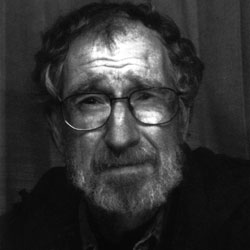He went there to have it
exact. The broken prose of the bush roads.
The piles of half-burnt slash. Stumps
high on the valley wall like sconces
on a medieval ruin. To have it tangible.
To carry it as a load rather than as mood
or mist. To heft it – earth measure,
rock measure – and feel its raw drag without phrase
for the voice or handle for the hand.
He went there to hear the rapids curl around
the big basaltic boulders saying
husserl husserl, saying I’ll
do the crying for you, licking the schists
into flat skippable discs. That uninhabit”ed laughter
sluicing the methodically shorn valley.
He went there to finger the strike/slip
fissure between rock and stone between Vivaldi’s
waterfall and the wavering note a varied thrush
sets on a shelf of air. Recognizing the sweet
perils rushing in the creek crawling
through the rock.
He knew he should not trust such
pauseless syntax.
That he should just say no.
But he went there just the same.
Notes on the Poem
"Loss Creek" is a poem from Don McKay's 2007 Griffin Poetry Prize winning collection "Strike/Slip". Loss Creek is a river on southern Vancouver Island that follows a straight, narrow, steep valley aligned to the Leech River Fault, a geological feature that originated as a strike-slip fault. Let's explore how McKay layers rich meaning on this striking (yes, word choice intended) yet shifting (slipping?) foundation. "He went there to have it exact." The poem's protagonist is seeking something clear and undeniable. "To have it tangible." Both the protagonist and the poet are looking to the real world for literally concrete proof of something. Rocks and rushing water, even the delicacy of birdsong ... "the wavering note a varied thrush sets on a shelf of air" are helping him to confirm ... what, we're not certain, but the repetition of "He went there" reinforces the protagonist's determination. What he is seeking solace for or insights into is hinted at in the unusual refrain "husserl husserl" Edmund Husserl was a 19th century German philosopher who tried to reconcile empiricism (observation) versus rationalism (reason and theory). That refrain is followed by "I'll do the crying for you" which seems to suggest letting the natural world express the feeling for you when you cannot express it yourself. The very literal poetry of direct experience, depicting sensations from the environment around one, illustrates the impossibility of completely and accurately capturing it in words, while celebrating the enduring challenge and attraction of trying. Off the page, paper or web, on which one reads "Loss Creek", the reader might be inspired to learn more about the eponymous waterway and will discover this: "As the Pacific Rim rock is uplifted and exposed it rapidly erodes; this releases the occasional gold deposit, which then collects in placer deposits in Loss Creek." (Loss Creek, https://en.wikipedia.org/w/index.php?title=Loss_Creek&oldid=638625852) What treasures - literal and figurative - are Loss Creek and the poem "Loss Creek."
